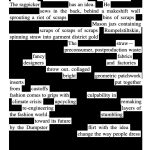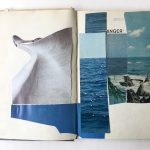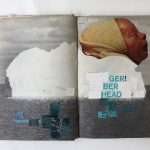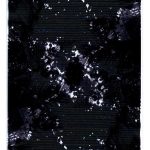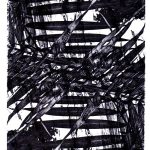The sensation starts on the red-eye, as we hover sleeplessly over the Atlantic: a faint flutter and then a pulse. The creature’s movements have been perceptible for weeks now, but this is different, diffuse and repetitive with no clear beginning or end.
Across the aisle, an older man struggles to breathe, and the flight attendants sweep toward the glow of his overhead light, fasten an oxygen mask over his nose and mouth. One stays beside him, her voice a comforting murmur beneath the plane’s vibrations. His face calms, but the hushed aura of emergency will not dissipate.
My phone dings; it’s time to stand again. Zack leans across the seat to massage my calves. We’re vigilant against blood clots, which, I’ve been warned, could gather strength in the murk of my insides and detonate. Not unlike the creature itself.
Until recently, the pregnancy had been mostly an abstraction. I was thicker around the middle with beautiful, engorged boobs but otherwise physically unchanged. Then, over a few weeks, I’d swollen, expanded, inflamed. My hips became tender things, my legs rebellious, their faulty wiring tripping electric shocks of sciatica. For the first time in my life, my body is armed and dangerous.
“Birth is like the ocean,” a midwife friend said. “Don’t turn your back on it.”
—
The question of children had been the defining fight of my relationship with Zack. More than anything, he wanted to be a father. But I dreaded motherhood, which seemed like a kind of brainwashing. On social media, old friends changed profile pictures to their children’s faces, as if the women themselves no longer existed. In interviews, famous actors declared motherhood the greatest role they’d ever played, as if children obliterated all achievements, took precedence over all desires. Even my own mother, now an accomplished professor with stints in Siberia and Central Asia, had put off work and travel when my brother and I were young, staying behind while my photographer dad spent the month in Tibet or Bosnia.
I, on the other hand, cultivated an unsettled, underpaid life with myself at the center. I bounced from Oregon to Thailand to Western Mass to DC to Philly, following friends and boyfriends, spending whatever extra money I had on parties and clothes. And why shouldn’t I be the center of my own existence? Men have lived selfishly for millennia and been rewarded for it. From what I’d seen, motherhood was womanhood at its least fun and most societally sanctioned: the useful body, the selfless days, the life of service.
But then I met Zack, a steady partner with a wild, artist’s soul, an uncommon combination. We fell in love, moved in together, built a whole universe of jokes and routines. If I refused motherhood, I’d have to start over without him. The thought was unbearable. After nearly a year of arguments, I’d decided our shared world was worth the many risks of having a child. At least I hoped it was.
I was thirty-five, we were newly married, and I got pregnant the first time we tried, as they say. The months of pregnancy stretched ahead of me, birth looming at the end like a ritual sacrifice. And then motherhood, in which I would be eaten alive by hormones and sleeplessness, reduced to a mere zombie of my previous self.
Travel seemed the only possible answer, the way I’d sought escape since I was young: familiarity sloughed away so only my bright, receptive core remained. Adventure.
Or, in this case, a visit to my brother and his family in Berlin.
The midwives said I could fly up to the thirty-fourth week of pregnancy, and I wanted good weather, so I booked our vacation for early May, my thirtieth week.
“Let’s set up the baby’s room before we go,” Zack had said.
“If he comes that early,” I said, “we’ll have bigger problems than a baby room.”
And now this fluttering pulsing in my gut, unlike any sensation I’ve read about online.
—
At the top of five interminable flights of stairs, we arrive at our Airbnb. A flustered young woman waits for us. Her father has just died, she explains in English. She canceled her other rentals but forgot ours. She needs a minute to collect her things. Torn between empathy and exhaustion, we follow her inside. I’m not about to surrender our rental after all those stairs. Plus, we don’t have anywhere else to go.
Her nondescript apartment is still strewn with belongings: mail on the table, necklaces on hooks, a cardigan over the back of the Ikea couch. There’s a risqué glamour shot of our host above the kitchen table. But a balcony overlooks the German rooftops. We can see the rough, rebuilt streets we wandered on our only other visit to Berlin, almost exactly a year ago. The overgrown parks where we drank beers in the sun. We could live in this city, Zack and I said then. We talked about it all year.
Finally, our host hands over the keys, and the door shuts behind her. We curl up on the hard couch, my belly against Zack’s back, the relief of arrival a near-physical release. But an hour later, the pulses wake me, more insistent this time.
I slide away from Zack without disturbing him. There’s an early spring chill in the apartment, and he’s wearing his black hoodie and knit beanie. He started going bald as a teenager, and he’s had a shaved head and full beard as long as I’ve known him. Zack isn’t a big man—he likes to say he wears size “smedium”—but he’s broad-shouldered and solid. The sight of him sleeping heartens me; nothing bad can happen when he’s nearby.
I begin researching the pulses on my phone. Google points to harmless “false contractions,” otherwise known as Braxton Hicks. Practice contractions, I read. A tightening that comes and goes. Normal, especially in the second and third trimesters. I take a deep breath; this has to be what I’m experiencing. But how will I know the difference between false contractions and real ones?
Unlike labor contractions, Braxton Hicks are not painful, I read. They do not come at regular intervals and do not become more frequent.
I try to time the pulses to see if they’re coming at regular intervals, carefully noting the start of each on a scrap of paper. But they’re slippery. Where is the border between sensation and no sensation? Our host’s digital clock, in military time like all European clocks, won’t cooperate. My list of numbers doesn’t make sense, refuses to attach to the minutes in this unfamiliar room.
But the sensations aren’t painful, I don’t think, just unpleasant, and I don’t want to be one of those uptight pregnant women who rushes to the hospital at the slightest thing.
—
Representations of birth are everywhere in pop culture, but they rarely include a satisfactory explanation of what labor actually feels like. The real-life movie we’d watched at the midwifery practice where I planned to give birth was no help either. Naked from the waist down, a woman rocked and sighed while her partner massaged her hips and the midwives moved purposefully around her. But her eyes were closed, and she seemed completely oblivious to her surroundings. I was appalled that anyone would let themselves be filmed in such a state.
The mysteries of the body have always frightened me, its unknowable organs and breakable bones. A troublesome shadow self that operates within me, conducting its own secret, perilous business.
In a yoga training, years ago, the teacher instructed us to embody our endocrine system by lying fetus-like on the floor. Then we were to rise slowly, as if through amniotic fluid, exploring movement with the moist, heavy knowledge of our kidneys and adrenals. As the other women wriggled around me, I found myself frozen with anxiety. What were my kidneys doing in there? And what if they stopped doing it? I had no control over their function or disfunction, and that petrified me.
As a child, my blood pressure spiked for routine physicals, though I rarely suffered even minor illness or injury. My doctors, all women, were mostly kind, but I still hated their touch. Cold fingertips searching for something gone wrong inside me. Proof that my body could contain the ultimate betrayal.
But even more than the exam, I dreaded the ride home, when I’d be trapped in the car while my mother talked about serious things. Woman things. For years, I wished not to get my period until I was older, to put off adulthood just one more year. I must have sensed how once my body was a woman’s body, it would cease to be only mine. I would occupy it, but others would regularly lay claim. Sometimes as an object of adoration. Sometimes an orifice. Sometimes a receptacle for a child.
—
The Braxton Hicks, if that’s what they are, haven’t worsened by dinnertime, so Zack and I walk the few blocks to Caleb’s co-op, passing kebab shops and knick-knack stores, oases of green tucked between imposing post-war apartment buildings. Caleb lives in one of these, and we cross a ramshackle courtyard to find him waiting for us at the door. My little brother, who at six feet tall is much larger than I am. My brilliant, loving brother, who has known me every day since memories began.
This is the first time he’s seen me pregnant, and I’m self-conscious of my conspicuous femaleness, my body-ness. But he doesn’t comment on my belly, just wraps me in a hard hug.
Caleb’s wife, Michele, and their son are in the kitchen they share with eight anarchist-leaning twenty-somethings. A dirty, inviting space packed with mismatched chairs and sundry dishes, recycled jars with no clear use, labels on everything, a chore chart. The cozy chaos of communal life. Nothing can replicate it.
Michele is American, though she grew up in Germany, which is why they are here. She’s warm and self-possessed with a wide, genuine smile. She and Caleb have been together ten years, so she’s known me through multiple cities, jobs, relationships. I would trust her with my life.
Thirteen months old and small for his age, my nephew is all silky blond hair and blue eyes. The last time we were here, he was six weeks old, a compact bundle of incessant need. It was a few months before our wedding, after which I’d agreed to get pregnant. Finding a baby in such close proximity was a shock.
During that visit, Caleb had worn him on his chest in a complicated wrap that appeared to be just a very long piece of fabric. The baby was hot or he was hungry or he had pooped or he was crying, and Caleb was always taking him off or putting him back on, tying and untying the wrap with its ends trailing on the ground.
Love for my nephew was supposed to come naturally, the way loving my brother did, but I could only see an infant like any other. Except this one would not let Caleb finish his sentences. No conversation was satisfying. No excursion went smoothly. Our time together was chopped up by baby cries and baby needs, and my future flashed before my eyes. But the wedding invitations were sent, my committment to parenthood sealed.
—
Years ago, I spent a night babysitting a friend of a friend’s son. This wasn’t something I did much, not even as a teenager, and I was exquisitely bored while the evening crept by.
As I was taking the little boy up to bed, he ran to the open window and yelled “Mommmmmyyyyyyy” into the darkness. “I can’t stop thinking about my mommy,” he sobbed when I comforted him.
The intensity of his love repelled me. A burden to be on the other end of all that need. I planned to be a successful writer and a world traveler, a woman who lived by her own rules. How could I have the life I wanted while a child cried for me?
Still, when motherhood was a distant fantasy, I assumed I’d have children someday. I let that assumption drift alongside me for years, a hazy possibility that contained a child.
Then women my age began to have kids. The Facebook feed of baby photos. Friends swallowed whole by their love. I’d never liked children, but I started to hate mothers. They canceled plans for nap schedules. Their conversations revolved around breastfeeding and daycare. What had happened to the brilliant, complex women I’d admired, the ones who were the protagonists of their own stories?
—
Over dinner with Caleb and Michele, I describe the sensations, but Michele didn’t have Braxton Hicks during her pregnancy and doesn’t know what’s normal. No one seems very worried. My due date is ten weeks away. We’re supposed to be on vacation.
But it’s been hours, and the Braxton Hicks, or whatever they are, won’t go away.
“I think I need to go to the hospital,” I say at last.
—
Michele, Zack, and I take the U-Bahn to the nearest hospital. Caleb stays with the baby, since Michele’s German is better than his. Through three never-ending subway stops, Zack and Michele small talk while I sink into my body. The contractions are suddenly agonizing, and I can barely keep up as we climb the flights and flights of stairs to the exit. It’s past ten p.m. when we finally emerge at the dark hospital grounds, which are sprawling like a college campus. Michele locates the correct building, and a receptionist asks for my passport through a hole in the window.
At first I can’t find it—If they won’t see me, I will refuse to leave—but thankfully it’s still in my bag from the flight.
“And your Mother Pass.”
“What? I don’t have one of those.”
She frowns. “That is not possible.”
I look helplessly at Michele.
“Here pregnant women get a Mother Pass from their doctors,” she says. “It has all your medical history.” She speaks German into the hole.
The receptionist narrows her eyes but waves us past.
We come to a waiting area with a couch and chairs, glass bottles of sparkling and still water. The hospital is clean and quiet with a pervasive sense of order, more like an office building than an American emergency room. No one else is waiting.
Now that we’re here, the contractions seem further apart, like when your car won’t make that strange sound at the mechanic. After what feels like a long time, a nurse brings us to another room for an EKG.
“They’ll be able to monitor the baby and the contractions,” Michele translates.
On my back, with my belly bearing down on my spine, I hope for contractions, so the machine can record them, and soon they gather strength and roll through, beginning low in the bowels, like intense menstrual cramps and radiating outward, down my legs, up my back. I watch the clock, trying to keep track of them, but the minutes have detached from their numbers again.
Zack and Michele are beside me, but it’s like they’re in another room. Here, the world has shrunk to a pinpoint of panic. I don’t tell them about the contractions; they can’t save me.
—
In my twenties, I spent six months in Thailand, where I regularly rode helmetless on the back of a friend’s motorbike. With his girlfriend between us, we raced down the unlit highways outside Chiang Mai, late at night, after we’d been drinking. That New Year’s Eve, a different friend and I ordered magic mushroom tea at an island bar, then hitched a ride in the back of a stranger’s pick-up, careening over the dark, potholed roads. Airborne as he accelerated, we clutched each other with the grim clarity that this had been a very bad idea.
Another time, in the US, a boyfriend ordered a research drug from the internet, which arrived in a pile of white powder that we eyeballed into doses. We took the drug camping, where we lit a fire, then wandered into the wilderness until we were utterly lost. The hallucinations illuminated the woods, turning the trees brilliant orange. We hadn’t started a forest fire, but I genuinely couldn’t tell.
In those days, my body was co-conspirator, collaborator. A tool for attracting men and converting drugs and withstanding risk, even with fear humming alongside. What could I take, who could I touch, where could I go to get closer to the yearning, seeking, wanting aflame under my skin. A brush with death here and there felt like part of the deal I’d made to be a girl let loose on the world.
Before Zack and I were married, when motherhood seemed unimaginable, I envisioned myself as that girl again. I saw how my parents would grow old and die. I saw how my brother would be absorbed by his new family. And I would have nothing to which to anchor myself. I would float away. But a child could ensure my place in the sequence. I would take my spot in the human cycle of generations. Better to have that mooring than none at all.
Now my body itself is anchor and threat: soft, vulnerable, contracting.
—
Unhooked from the machine and back in the waiting area, I’m increasingly desperate. The deep, gut-sick feeling expands and obliterates. Like waves of terrible diarrhea combined with a kind of nausea. Only this nausea does not point up to the throat but down. Inside a contraction, stillness is ludicrous, and I squat, stand, squat again. Though movement does not bring relief, it is my only weapon against the roiling pain.
Michele is about to look for help when a woman calls us into an exam room. Her manner is brisk and dismissive, and she must be a decade younger than I am. I instantly dislike her. But she appears to be the doctor, and she speaks English.
“Where is your Mother Pass?” she asks.
“I don’t have one.”
She’s incredulous. “But you must have a Mother Pass.”
“We don’t in the US.”
“That is impossible. You cannot travel without a Mother Pass.”
“I just don’t have one.”
She eyes me suspiciously. “When is your due date?”
“July 9th.” Today is May 1st.
She doesn’t react, consults the EKG results. “The baby is fine,” she says. “He is not under stress.”
“What about the contractions?”
“They don’t mean anything.”
I stare at her, speechless. I will not leave this hospital.
She speaks to Michele in German, practically rolling her eyes, then instructs me to get on the table for an ultrasound. I do as I’m told, helpless and enraged.
On my back again, in exquisite discomfort, the doctor presses the ultrasound wand hard into my belly.
A second young woman has appeared, a nurse or another doctor, and she draws a curtain between us and Zack and Michele. They tell me to strip from the waist down, but do not offer a sheet or a hospital gown. I have no choice but to bare myself.
Instead of an exam table with stirrups, they direct me to a spread-eagle chair. My thighs rest on movable arms that spread up and apart, exposing and restraining me. Tears run down my cheeks into my ears. They poke and prod and swab indifferently, while I writhe in pain and embarrassment, muted by my sore, defenseless body.
“Stay still,” they say over and over.
“I can’t,” I say. “I’m having a contraction.”
At last, they check my cervix.
“You’re two centimeters dilated,” the first doctor says, surprised.
I could have told you that, I want to scream.
“You will stay here with us.” Her voice is gentler now.
I begin to sob uncontrollably, desperate to get out of the spread-eagle chair.
“Can I come over there?” Zack calls from the other side of the curtain.
His alarm is audible, but I don’t want him to see me in that chair.
The doctor explains what they will do. First, a steroid shot to develop the baby’s lungs. Then a magnesium drip to slow the contractions. “You may be here a couple weeks or more,” she says. “But you will eventually need a C-section because the baby is breech. Do you understand?”
“Yes.”
I’m allowed to move from the chair.
“You may not be able to have a vaginal birth in the future after a C-section,” the doctor says. “Do you understand?”
“Yes.” I almost laugh at how little this concerns me.
They pull back the curtain, and Zack rushes to the table where I’m curled with the magnesium IV in my arm. He hugs me, his face wet against mine, his worry and love pulsing through me. I matter to this person.
Then the worst contraction hits, and I’m pinned moaning beneath it. They say women don’t remember the pain of labor, but I will. I will replay the experience over and over, so I won’t forget, so I can tell people. But even though my memories will be clear, the words will never be right.
The doctors must be sufficiently alarmed, because they check my cervix again. I’ve gone from two to nine centimeters dilated in twenty minutes, a process that usually takes hours.
“The baby has to come out now,” the first doctor says.
—
I’m a body on a gurney, wearing only my T-shirt, rolling through hospital hallways. Strange faces speak above me.
“Can I have something to cover me?” I ask.
The faces seem startled. I’m given a sheet, but it’s folded in a tight square.
Soon we’re in the bright operating room.
“Stay still,” is all they say in English.
An impossible request as the contractions rage through me.
Everywhere hands are on me, swabbing, prepping, holding down my legs. These hands are an invasion, and they will save my life.
One of the faces removes its mask, leans close. “I’m the surgeon,” says a woman, calm and serious. “We strongly recommend a C-section, but if you want you can try to birth vaginally.”
I’m confused and horrified. “No. C-section!”
“So you agree?”
“Yes.”
Next the anesthesiologist materializes at my side. His eyes are kind. “We don’t have time for an epidural,” he says. “We will use general anesthesia.”
I know this means my situation must be very serious.
He asks questions that seem crucial. Do I have medication allergies? Are there heart conditions in my family?
I search my mind for the right answers. “Caffeine gives me heart palpitations.”
“Has it ever caused you to have a heart attack?”
“No, just anxiety.”
He laughs, a comforting, human noise.
I want to tell him not to let me die, but even saying those words feels like a curse. “Take good care of me.”
“I will,” he says.
Last, a woman grasps my hand. “I’m the midwife,” she says. “I’ll be looking after your baby.”
I had practically forgotten the baby; in this moment it is of no consequence to me.
The anesthesiologist puts the mask over my face. “You may feel warm.”
Instead, cold spreads down my throat, and the world blinks off.
—
This is when the body becomes just a body. It still wears my jewelry, has my face and unruly hair. They cut it open, take the creature out, sew it back up. The surgeon’s long hands tighten the skin, seal the body closed. Then they dress the body in mesh underwear, an oversized pad for the blood. At last they cover the body and wheel it away.
—
I wake up in the recovery room, delirious with drugs and gratitude. I’m alive alive alive. Zack, Michele, and Caleb surround me, laughing; I’ve said something funny. My good fortune is overwhelming, life unbearably sweet. The creature is expelled, my body uninhabited, released from its sentence as vessel, repository, container. The sacrifice has been made and yet here I am, whole on the other side.
But above my pubic bone, a bright wound burns, the skin around it numb.
In a few days, I will leave this hospital, so exhausted that Zack will push me in a wheelchair for a week. But months later, scanning myself critically in the mirror, even I will see that this new body, once cut open and sewn shut, is nearly indistinguishable from the old body, the one that, barely tethered, pitched carelessly through the world. That white line above my pubic bone will seem a small price to pay for this body.
And my son? Red and little and too young to be angry, he’s taken to the NICU, attached to tubes and monitors. For four weeks he will drift there, mostly asleep, a tiny uncertain presence. In six weeks, he will be released from the hospital, and in ten weeks, he’ll be cleared for the long, long-awaited flight home. Will I love him? Slowly, yes. But this is not his story.





